Blog / Top 8 Marketing Analytics Tools Compared
Top 8 Marketing Analytics Tools Compared
In the UAE's fast-paced digital market, choosing the right marketing analytics tool is critical for tracking campaigns, understanding behaviour, and maximising ROI. Here's a quick breakdown of the 8 tools reviewed:
- Wick: Strong on data integration and localisation for UAE businesses, with Arabic support and pricing in AED.
- Google Analytics 4 (GA4): Free, connects with Google tools, supports AED and local time zones, but has a steep learning curve.
- Power BI: Excellent for visualising complex data, integrates with Microsoft tools, and supports Arabic and AED.
- Tableau: Advanced data visualisation, handles large datasets, but expensive and requires training.
- Hootsuite Analytics: Simplifies social media tracking, supports Arabic, but focuses mainly on social platforms.
- Sprout Social: Centralises social media management, integrates with CRM tools, but premium plans are costly.
- Brandwatch: Excels in sentiment analysis and social listening, supports Arabic, but geared towards larger businesses.
- Zoho Social: Affordable, integrates with Zoho tools, supports Arabic, but lacks advanced analytics.
Quick Comparison
| Tool | Key Features | Price in AED | Best For |
|---|---|---|---|
| Wick | Localised insights, AI-driven tools | Custom | UAE-specific campaigns |
| GA4 | Free, machine learning, AED support | Free | Small businesses, startups |
| Power BI | Data visualisation, Arabic support | ~37/month | Microsoft users, data-heavy teams |
| Tableau | Advanced visualisation, custom maps | ~2,200/year | Enterprises, skilled analysts |
| Hootsuite | Social media tracking, Arabic support | Varies | Social media-focused teams |
| Sprout Social | Unified social management, CRM links | ~370/month | Multi-channel social strategies |
| Brandwatch | Sentiment analysis, global coverage | High | Large-scale social listening |
| Zoho Social | Affordable, Arabic content support | ~37/month | Small to medium businesses |
Each tool suits different needs based on your business size, technical skills, and budget. For UAE businesses, Arabic language support, AED pricing, and localised metrics are essential considerations. Start small with free or affordable tools and scale as your requirements grow.
9 Best Web Analytics Tools (2023)
1. Wick
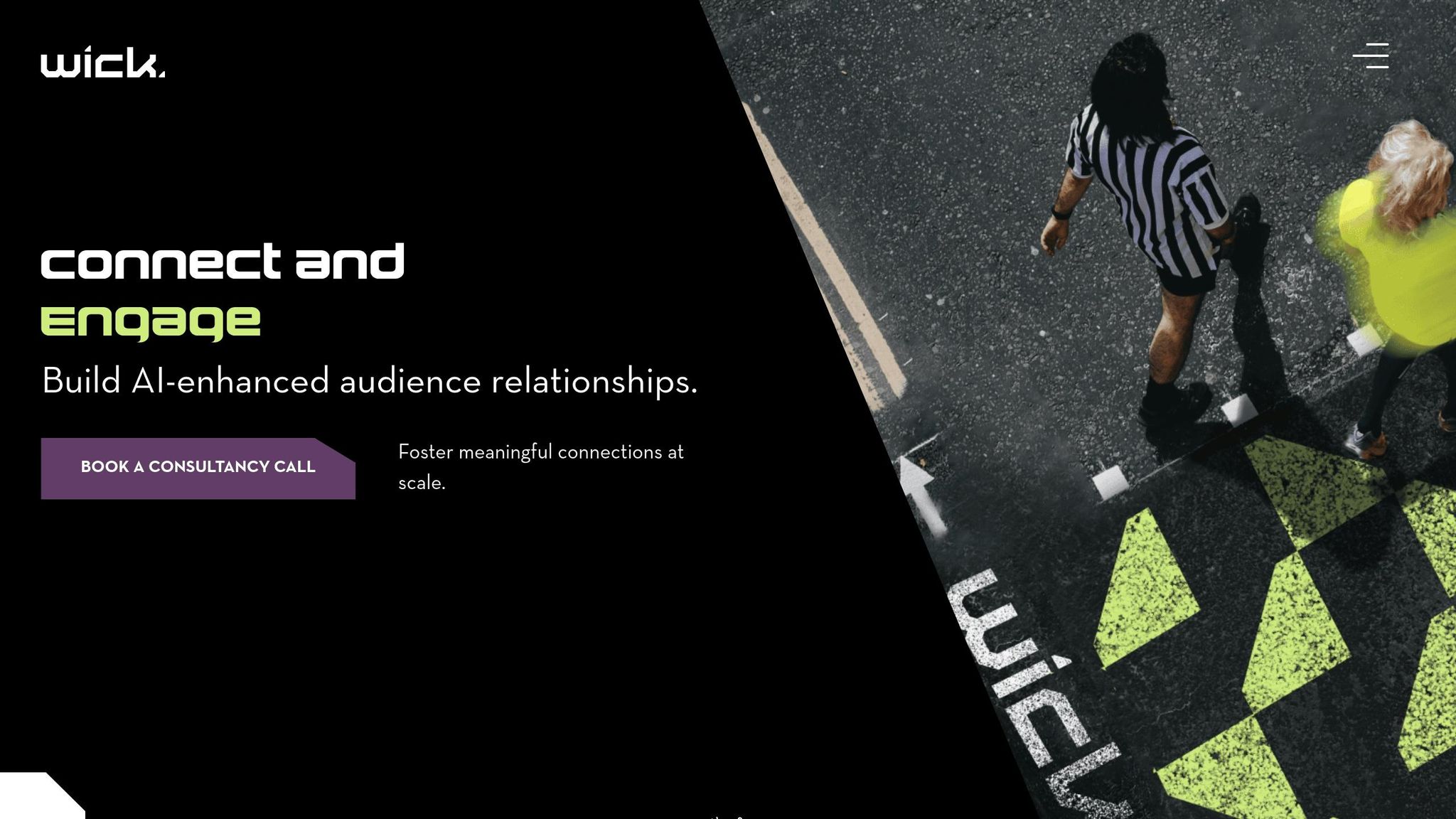
Wick is a marketing analytics platform designed to drive data-focused growth, built around its unique Four Pillar Framework.
Data Integration Capabilities
Wick's KingdomDS platform takes data from various sources and transforms it into a secure, AI-ready format by normalising, classifying, and structuring it. With its WorkbookAI feature, the platform enriches and integrates these datasets, giving AI agents the ability to make precise decisions and take targeted actions.
Instead of merely linking to external platforms, Wick puts a strong focus on standardising structured data. This approach allows AI agents to operate with accuracy and ensures processed data can be seamlessly routed back into an enterprise's AI stack. These advanced data processes are key to Wick's regional customisation.
Localisation Features
Understanding the UAE's multicultural audience, Wick incorporates Arabic language support and aligns with important local events like Ramadan, Eid, and the Dubai Shopping Festival. The platform also supports right-to-left text formatting for Arabic, making it easier to segment audiences based on language and cultural nuances. This localisation ensures that marketers can rely on Wick for insights tailored to the UAE's diverse market.
Reporting and Dashboard Customisation
Wick offers a flexible reporting interface, allowing businesses to choose between high-level ROI summaries or detailed performance analytics. Reports are formatted to align with UAE business practices, ensuring relevance and usability.
Pricing in AED
Wick’s pricing is presented in AED and is structured across three tiers - Basic, Advanced, and Enterprise - catering to businesses at different stages of growth.
AI Marketing Capabilities
Wick’s AI tools handle SEO, reputation management, and social media automation, simplifying digital marketing efforts without relying on third-party tools.
2. Google Analytics 4
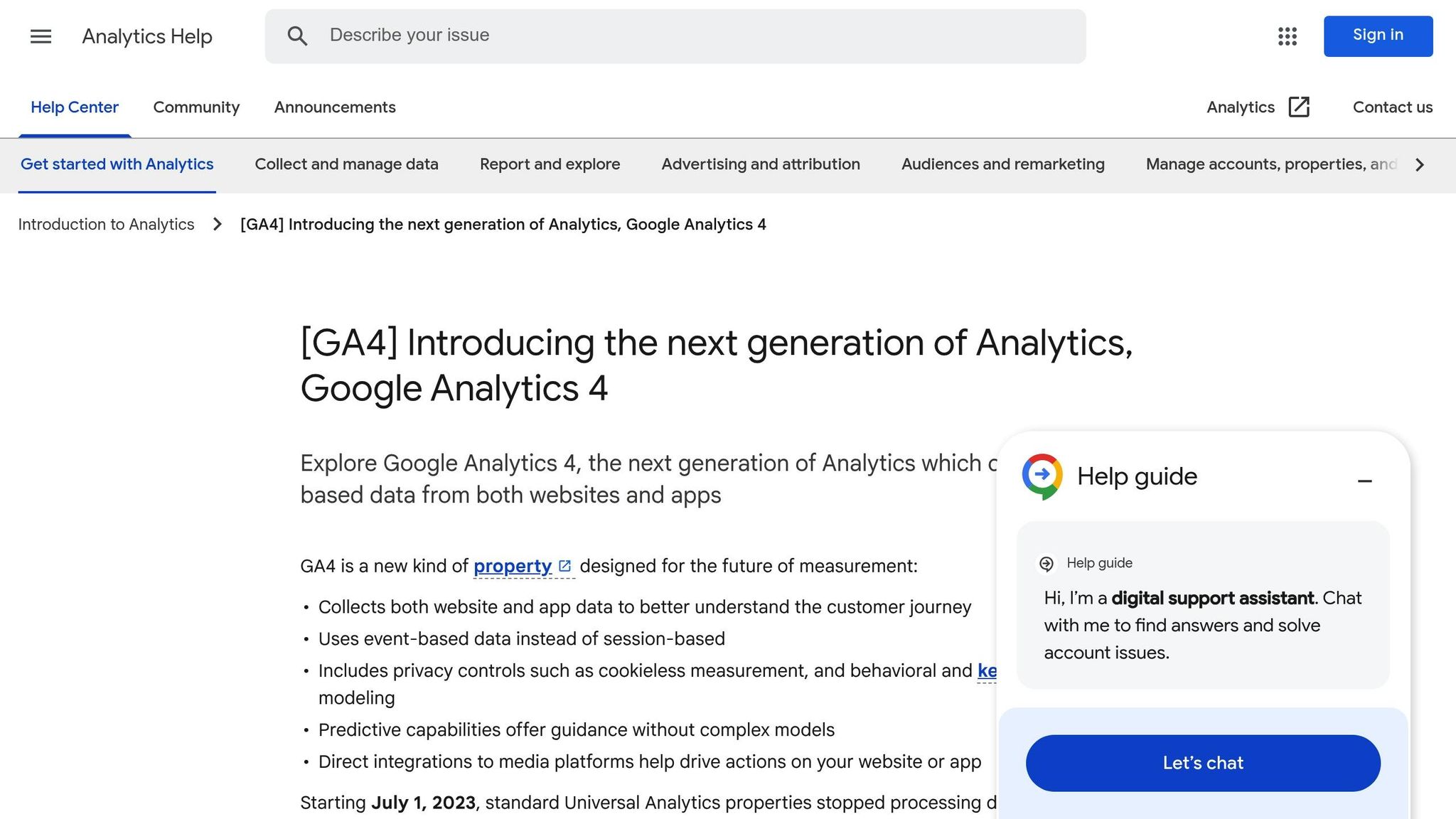
Google Analytics 4 (GA4) is Google's latest tool for tracking web and app analytics. It offers advanced features for collecting and analysing data, giving marketers valuable insights into user behaviour across various platforms. Let’s dive into how GA4 connects data across systems and supports localisation for UAE businesses.
Data Integration Capabilities
GA4 connects directly with key platforms like Google Ads, Search Console, and YouTube Analytics. It also supports data imports via the Measurement Protocol and the Google Analytics Intelligence API. These connections make it easier to gather and analyse data from multiple sources in one place.
Localisation Features
For businesses in the UAE, GA4 simplifies localisation by enabling currency settings in AED and aligning reports with local timezones. AED can be set as the default currency in Property Settings, and GA4 allows for handling multiple currencies by specifying the local currency when sending transaction data. Currency conversions are performed using the previous day's exchange rate.
Time settings are equally flexible. The "Time zone country or territory" setting in GA4 determines how dates appear in reports. Dates are stored in a YYYYMMDD format, reflecting the timezone registered for the property. Event timestamps, however, are recorded in microseconds using UTC.
These features ensure that GA4 is well-suited to meet the specific needs of UAE businesses.
3. Power BI
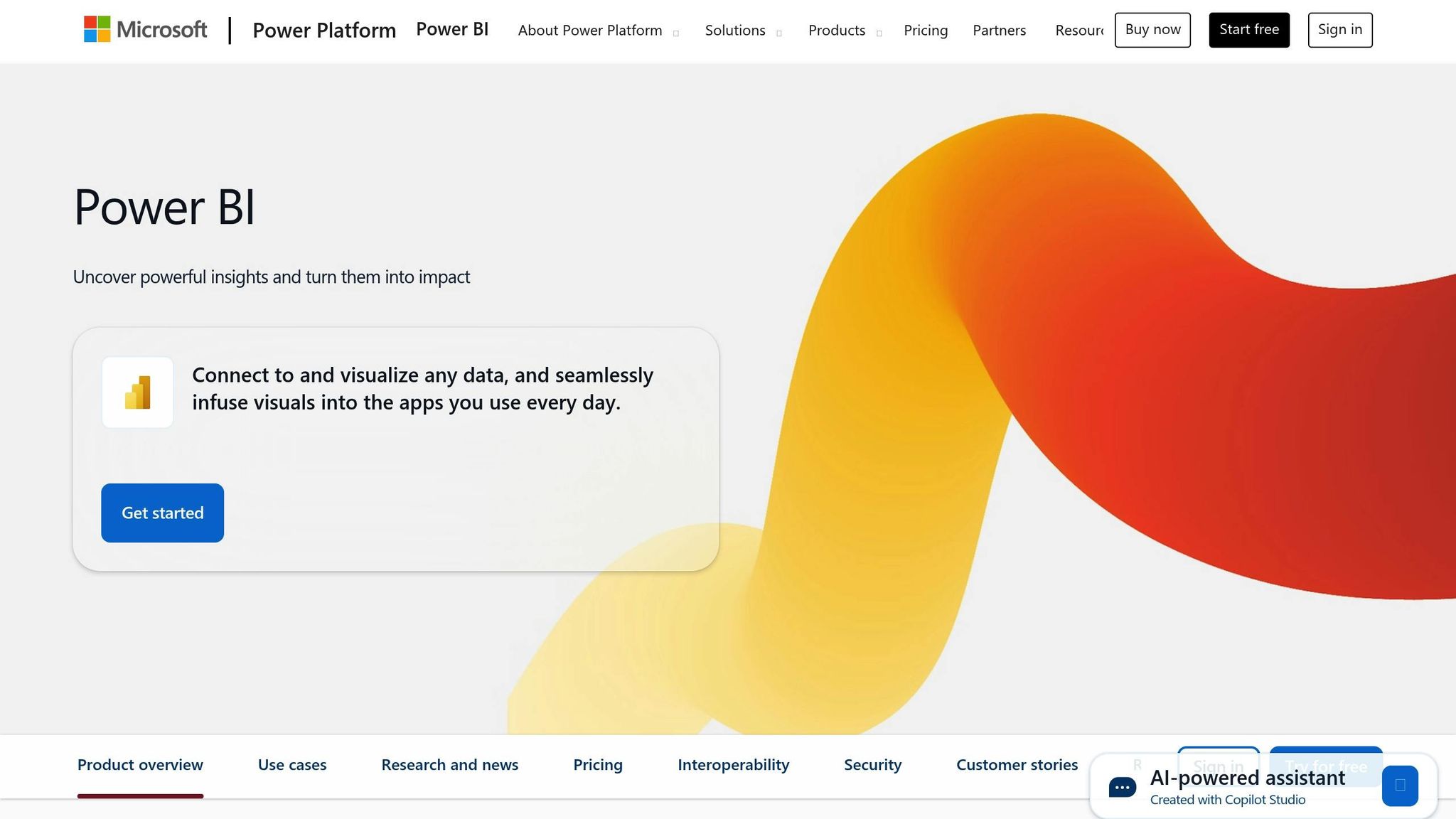
Microsoft Power BI takes raw marketing data and turns it into actionable insights. With its interactive dashboards, marketers can track campaign performance, understand customer behaviour, and monitor revenue trends - all in real time.
Data Integration Capabilities
Power BI excels at bringing data together. It works seamlessly with Excel spreadsheets, SQL databases, and cloud services like Azure and SharePoint. Using Power Query, the tool cleans and merges data from various sources - like social media, email, and website analytics - into unified reports. For marketers, this means having a single source of truth to monitor live campaign performance, especially during high-traffic events like Ramadan or the Dubai Shopping Festival.
Localisation Features
Designed with the UAE in mind, Power BI offers localisation features that enhance user experience. The platform supports an Arabic language interface and right-to-left text formatting, making it accessible for Arabic-speaking teams. Currency values can be displayed in AED (د.إ), and date formats follow the DD/MM/YYYY structure commonly used in the Emirates. Additionally, its ability to manage multiple time zones is a big plus for businesses operating across the UAE or running international campaigns.
Reporting and Dashboard Customisation
Power BI makes creating custom dashboards simple and intuitive. With drag-and-drop functionality, marketers can build visualisations like charts, graphs, maps, and even custom visuals. It also provides templates tailored to specific analytics needs, such as measuring campaign ROI, tracking customer acquisition costs, or monitoring social media performance. The mobile app ensures these dashboards are accessible anytime, fully functional on both iOS and Android devices. This level of customisation sets a solid foundation for diving into advanced analytics.
AI and Predictive Analytics
Power BI integrates advanced AI tools through Azure Machine Learning. Features like Quick Insights help identify trends and anomalies in data, while forecasting tools predict future performance based on historical trends. The natural language query function is particularly user-friendly - just type a question like "What was our top-performing campaign last month?" to get an instant visual answer. Anomaly detection is another standout feature, alerting marketers to unexpected changes in metrics, whether it’s underperforming ads or a sudden spike in viral content. These tools empower marketers to act quickly and make data-driven decisions.
4. Tableau
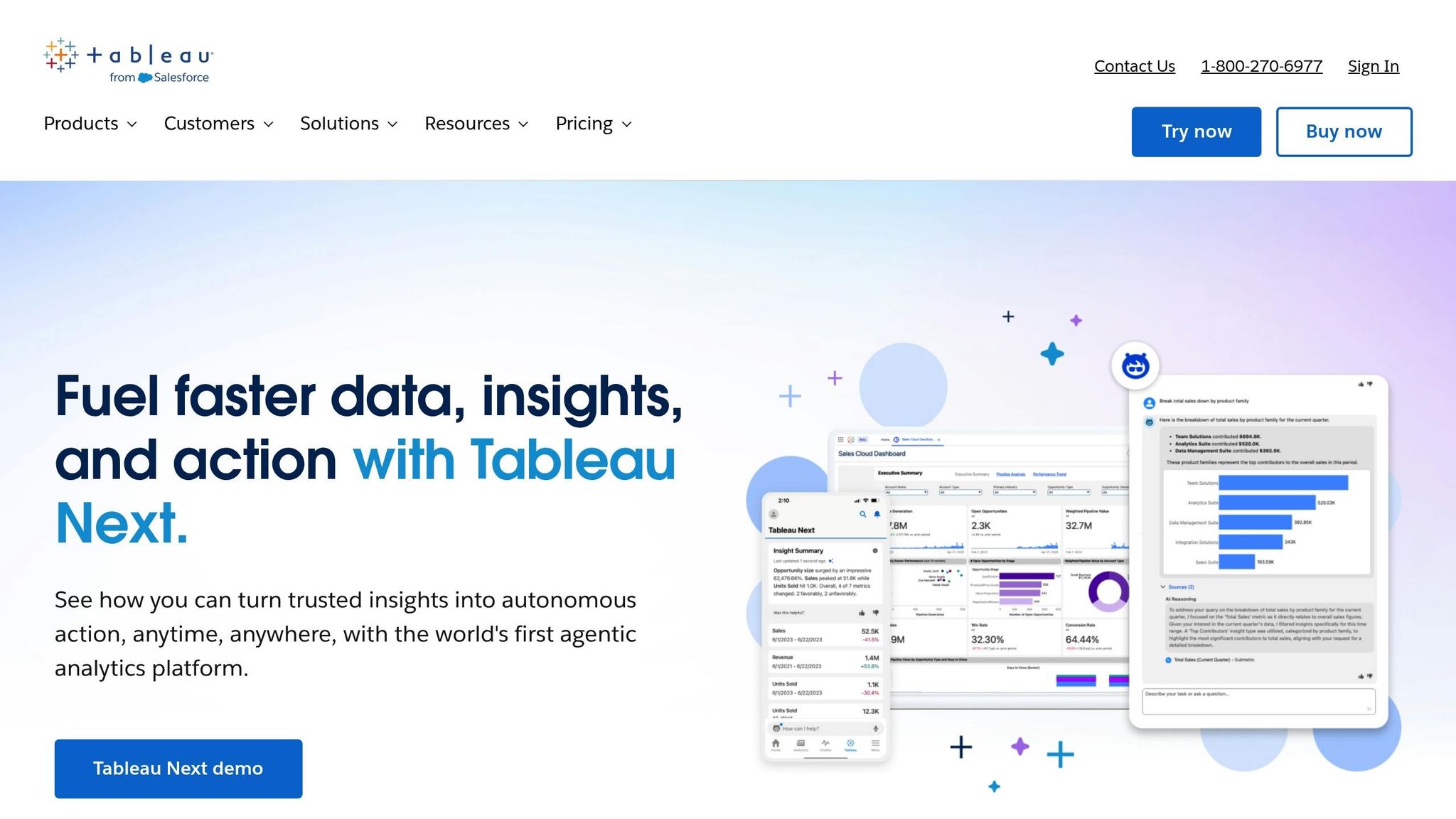
Tableau is a leading data visualisation tool that simplifies complex marketing data, turning it into clear, interactive dashboards. These dashboards not only highlight trends but also provide insights that can drive decision-making.
Data Integration Capabilities
One of Tableau’s strengths lies in its ability to integrate seamlessly with a wide range of data sources. It connects effortlessly with cloud platforms like AWS, Azure, and Google Cloud, as well as major databases such as MySQL, PostgreSQL, Oracle, and Snowflake. Its ETL (Extract, Transform, Load) features make it easy to pull data from various sources like CRMs, social media APIs, and e-commerce systems. For businesses in the Middle East, Tableau Next takes this a step further by offering integration with all major cloud platforms, databases, and BI tools. This creates a unified view of campaign performance, helping businesses streamline their analytics processes.
Reporting and Dashboard Customisation
Tableau’s reporting features are equally impressive, offering a high degree of customisation, particularly for geographic data. This is especially beneficial for businesses in the Gulf region, as it allows users to define and visualise custom geographic regions that go beyond standard boundaries. Additionally, the platform supports map customisation by allowing the import of background maps from Web Map Service (WMS) servers or Mapbox. Users can also control map layers, including streets, borders, cities, and points of interest. These tools empower UAE businesses to gain deeper insights and make more informed decisions based on location-specific data.
5. Hootsuite Analytics
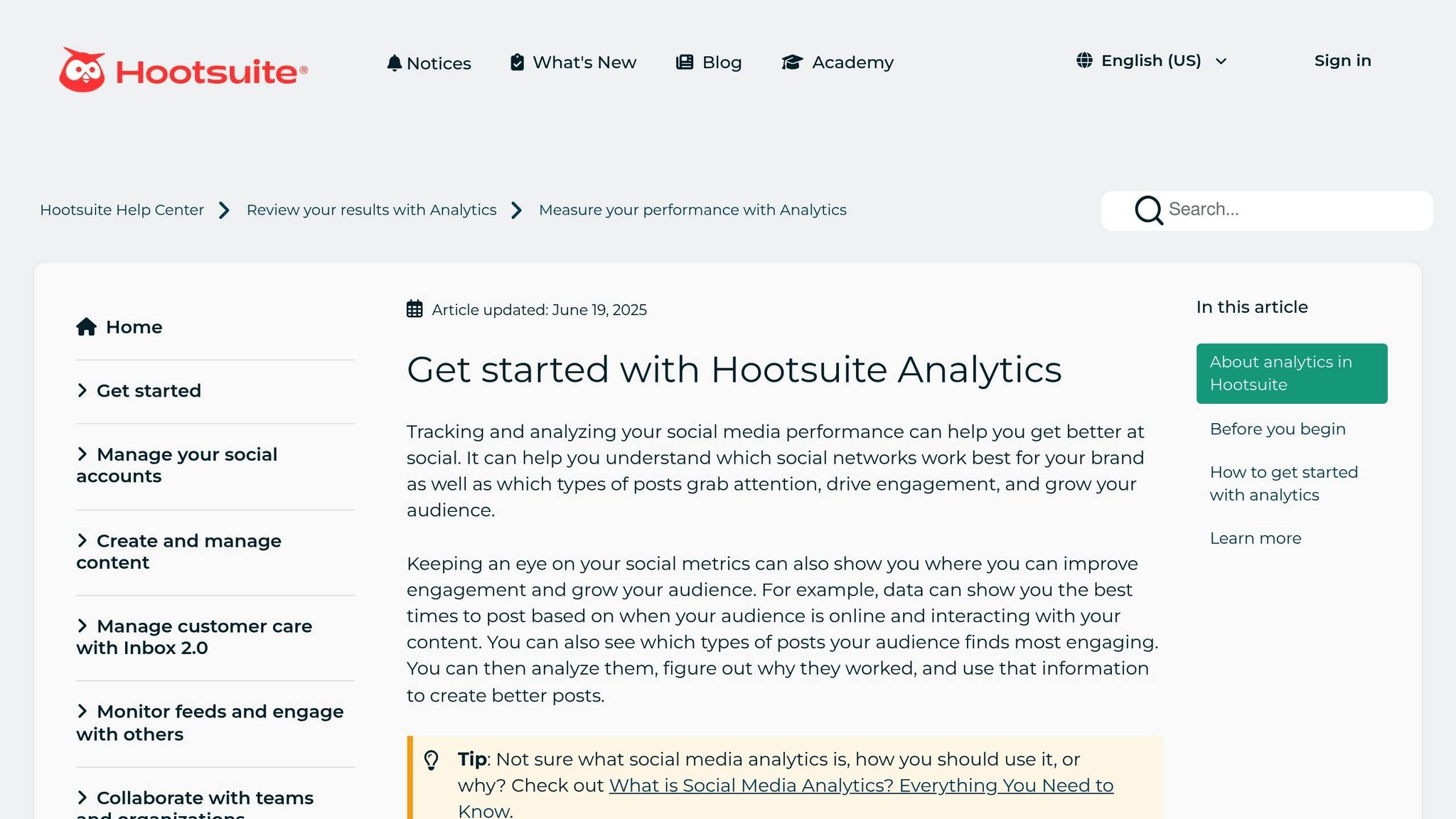
Hootsuite Analytics is a powerful platform designed to simplify social media tracking for businesses juggling multiple channels. By bringing together performance data from various platforms, it provides marketers with a clear view of engagement rates, follower growth, and campaign results - all in one easy-to-navigate dashboard.
Data Integration Capabilities
Hootsuite Analytics connects effortlessly with major platforms like Facebook, Instagram, Twitter, LinkedIn, YouTube, and TikTok. It pulls live data from these channels, allowing businesses to keep a close eye on their social media performance. The OwlyGPT AI assistant adds another layer of functionality by scanning social feeds in real time to spot trending topics and analyse performance trends. This seamless integration ensures businesses can adapt their strategies to suit specific regions.
Localisation Features
For companies operating in the UAE, Hootsuite offers tools designed with local needs in mind. It supports Arabic language settings with proper right-to-left text alignment. Users can also adjust time zone preferences, though reports are standardised in GMT. Additionally, its sentiment analysis feature works across 18 languages, including Arabic, using machine learning trained on millions of comments and responses.
AI and Predictive Analytics
Hootsuite takes analytics further by harnessing AI for advanced insights. The OwlyGPT assistant generates content ideas and drafts posts based on trending topics. It also provides real-time sentiment analysis by categorising mentions as positive, negative, or neutral across multiple languages. This predictive functionality allows businesses to anticipate customer reactions and fine-tune their messaging accordingly.
User Feedback
Courtney W., a Social Media Manager, shared: "Hootsuite makes my life 10x easier!"
Hannah S. from VAZZO Creative added: "Hootsuite cut our team's workload in half!"
sbb-itb-058f46d
6. Sprout Social
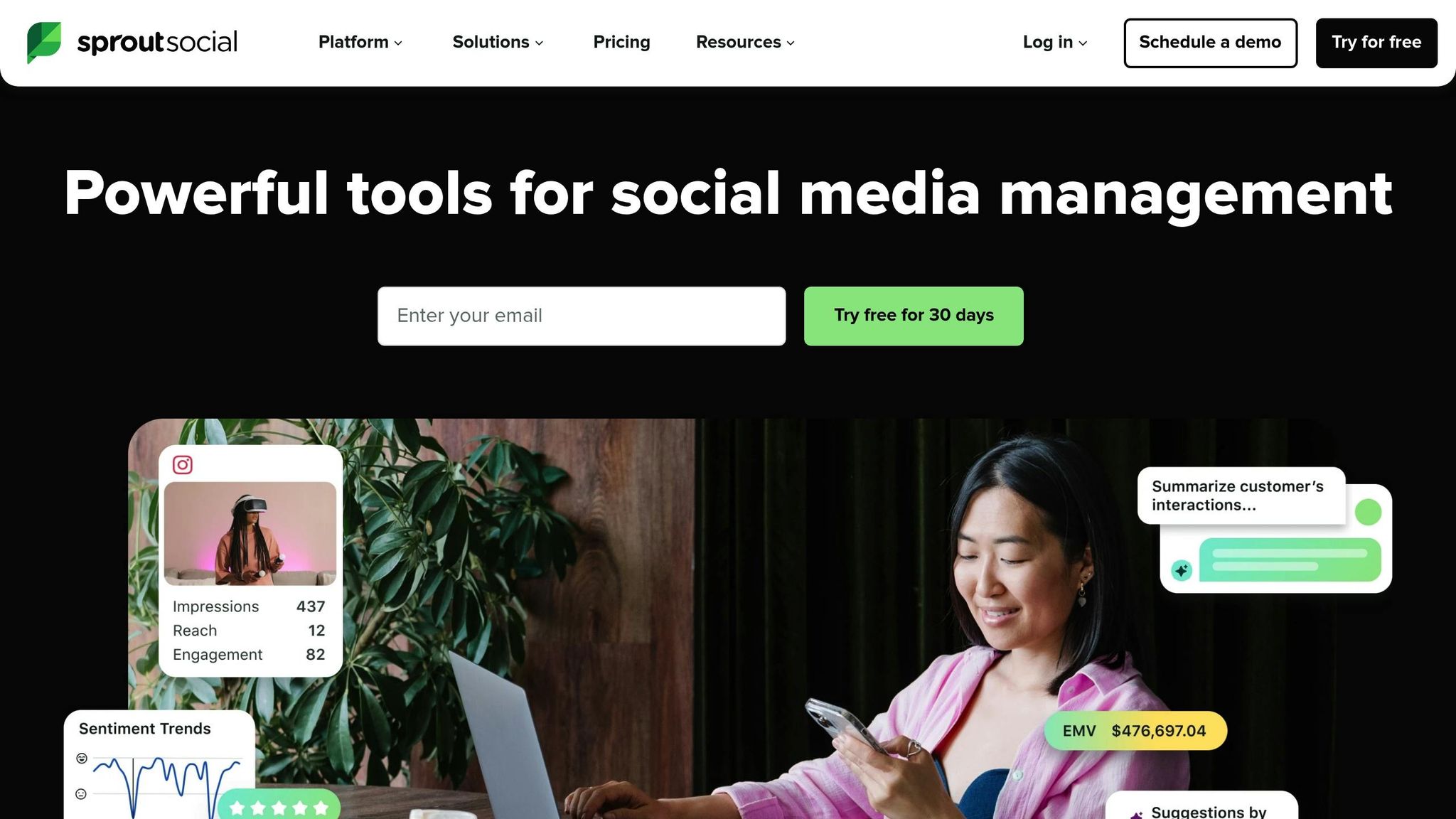
Sprout Social offers a unified platform designed for managing social media, tracking engagement, and analysing performance. It serves as a centralised hub that simplifies monitoring across multiple channels while ensuring your brand's messaging remains consistent throughout campaigns.
Data Integration Capabilities
Sprout Social connects effortlessly with major platforms and tools widely used in the Gulf region. It integrates with popular social networks like Facebook, Instagram, TikTok, X, LinkedIn, YouTube, Pinterest, Threads, and Bluesky, as well as messaging apps such as WhatsApp and Facebook Messenger, enabling direct communication with customers. Beyond social platforms, it syncs with key business tools, including:
- BI tools: Salesforce Marketing Intelligence Cloud, Tableau
- CRM systems: Marketo, Microsoft Dynamics 365, Salesforce Marketing Cloud, Salesforce Sales Cloud
- Help desk solutions: HubSpot, Microsoft Dynamics 365, Salesforce Service Cloud, Zendesk
- Reputation platforms: Google My Business, Yelp, TripAdvisor, Trustpilot, Glassdoor
These integrations make Sprout Social a powerful asset for data-driven marketing strategies. Its ability to connect with such a wide range of tools enhances its analytics capabilities, positioning it as a strong contender when compared to other platforms.
7. Brandwatch
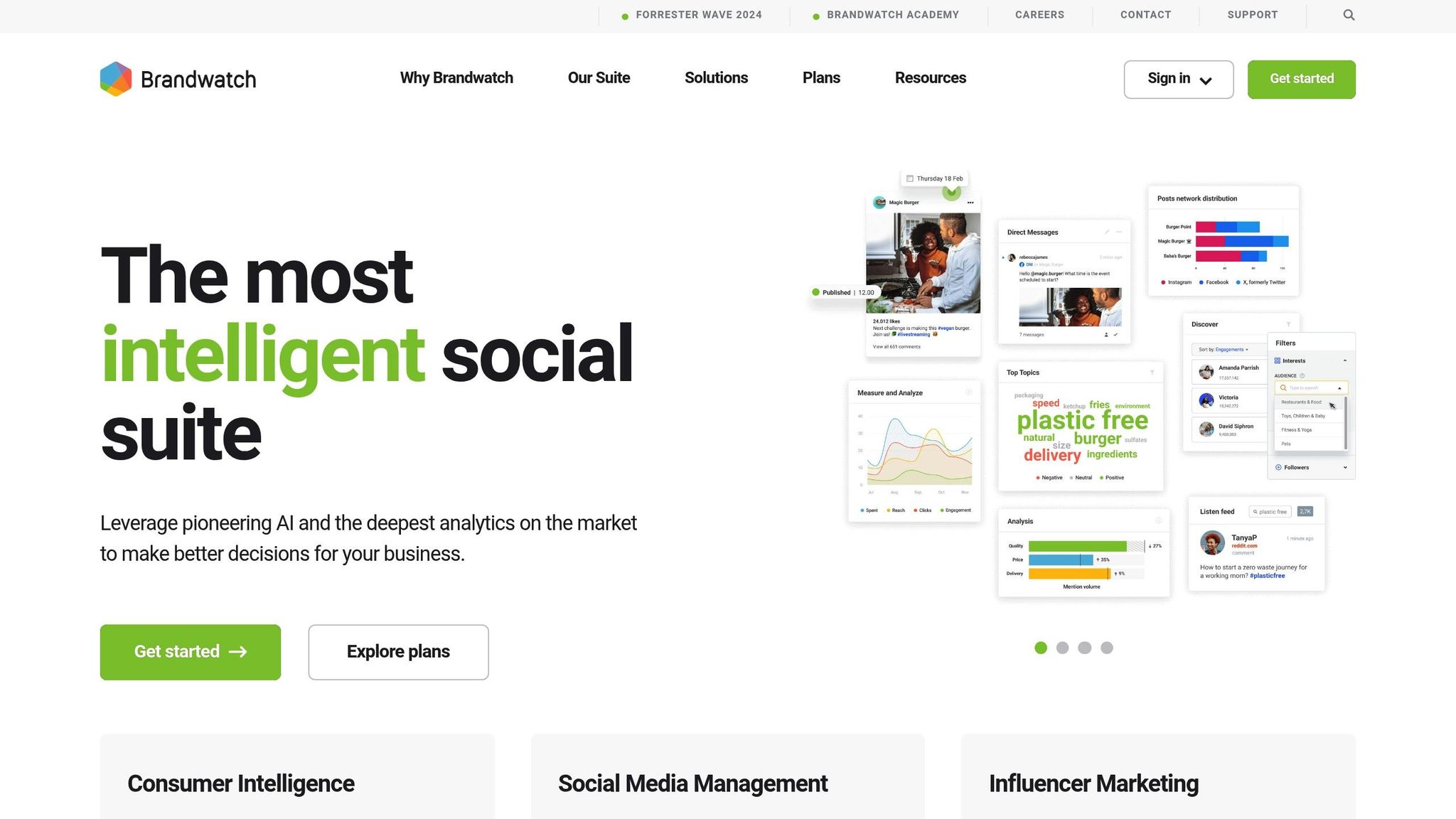
Brandwatch is a robust platform for social listening and consumer intelligence, designed to track brand mentions, analyse sentiment, and study consumer behaviour across digital spaces. It gathers insights from social media, news outlets, blogs, forums, and reviews, offering a clear picture of market positioning and consumer perception. Let’s dive into its data integration capabilities.
Data Integration Capabilities
Brandwatch pulls data from a vast array of online sources, including Twitter, Facebook, Instagram, YouTube, Reddit, TikTok, and more. Beyond social media, it also monitors blogs, forums, and news sites. Impressively, it supports data collection in any language and performs sentiment analysis in 44 languages, making it particularly useful for businesses in the Gulf region that need insights in Arabic.
The platform integrates effortlessly with business intelligence tools and supports exporting data in formats like Excel, CSV, JPG, PNG, and even customisable PowerPoint reports. This versatility ensures that marketing teams can seamlessly incorporate Brandwatch insights into their existing workflows and combine them with data from other analytics platforms.
Localisation Features
Brandwatch excels in precise location-based analysis, allowing users to filter data by continent, country, state, city, or even down to a specific street. This level of granularity is ideal for companies running campaigns across the Emirates or other Gulf countries, where localised insights are essential.
The platform’s Location tab in its Reviews dashboards makes it easy to view reviews by country of origin and compare sentiment across regions. This feature is particularly valuable for tailoring campaigns to specific audiences within the Gulf.
Reporting and Dashboard Customisation
Brandwatch offers highly customisable dashboards, whether users prefer to build their own or work with pre-built templates like Single Product Deepdive, Single Brand Deepdive, or Single Category Deepdive. These templates are tailored to meet specific analytical needs.
Users can add KPIs to dashboards using widgets and components that display data as charts, maps, or topic clouds. Dashboards can be filtered by date ranges, keywords, or entity maps, and unique views can be saved for various purposes, such as quarterly reviews or campaign-specific reporting.
The platform’s 'Rules' feature is another standout, allowing businesses to segment both historical and future data into custom categories and KPIs. This is particularly useful for aligning insights with Gulf market dynamics.
AI and Predictive Analytics
Brandwatch incorporates AI to refine data processing and deliver sharper insights. Its AI-powered sentiment analysis classifies mentions in 44 languages as positive, negative, or neutral, while also identifying the emotional tone behind them.
The platform’s entity mapping uses machine learning to group related entities into thematic categories, ensuring insights are both accurate and relevant. Automated reports in HTML or PDF formats can be generated, and email alerts can notify teams about key changes, such as spikes in conversation volume, sentiment shifts, or influencer activities.
Additionally, its AI-driven segmentation tools simplify trend comparisons, helping marketing teams identify emerging patterns and adapt their strategies swiftly. This predictive edge ensures businesses stay ahead in a fast-changing market.
8. Zoho Social
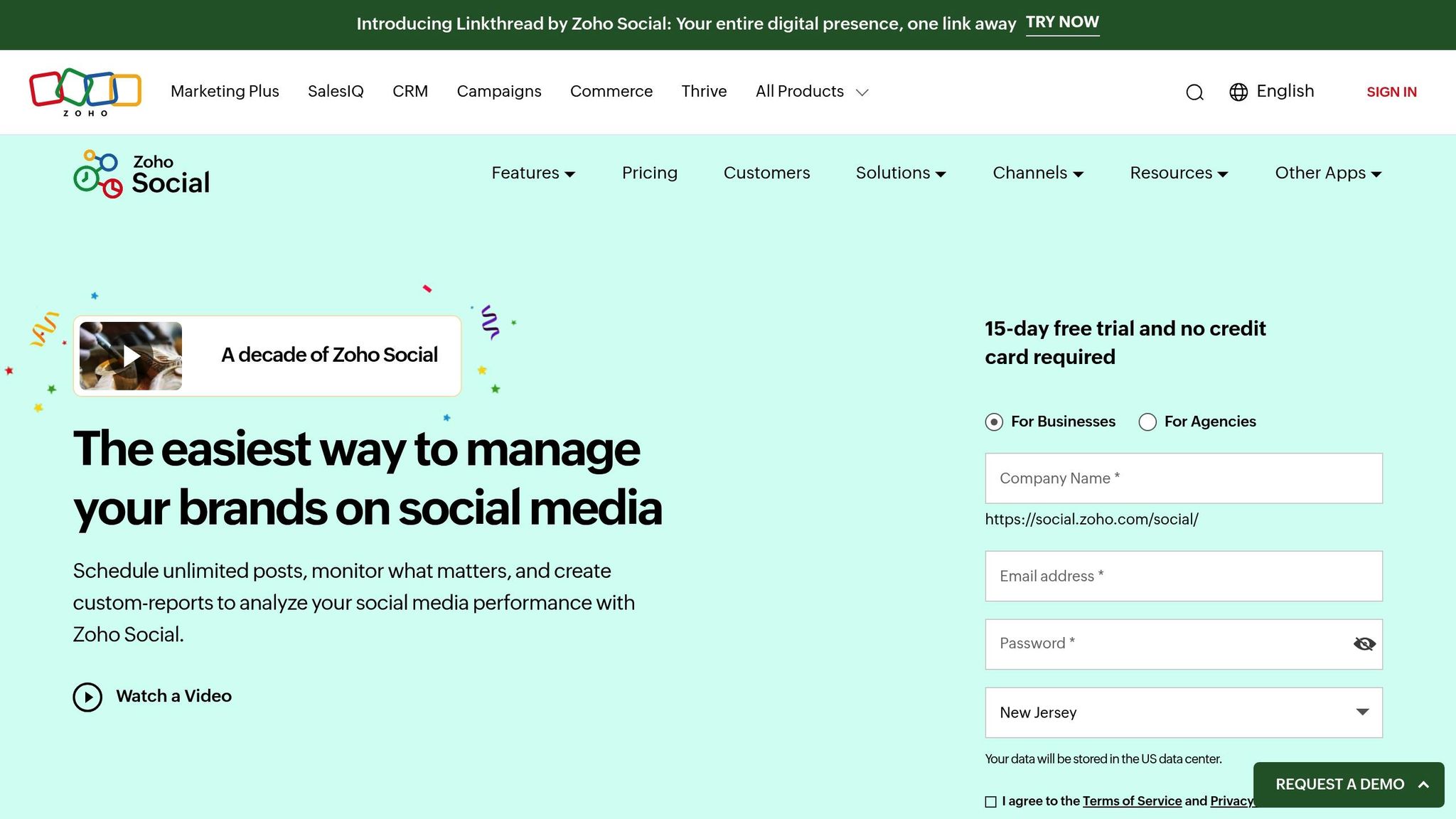
Zoho Social rounds out our comparison by combining scheduling, monitoring, and analytics into a single platform. As part of the larger Zoho ecosystem, it’s tailored to help businesses simplify their social media efforts while offering useful insights into audience behaviour and campaign performance. Its appeal lies in its straightforward interface paired with robust analytics, making it a practical choice for both small businesses and larger enterprises across the Gulf region.
Data Integration Capabilities
Zoho Social integrates effortlessly with major platforms like Facebook, Instagram, Twitter, LinkedIn, YouTube, Google My Business, and TikTok. It automatically gathers key metrics like engagement rates, audience demographics, and post-performance data, creating a centralised dashboard for social media analytics.
This tool also connects seamlessly with Zoho CRM, Zoho Analytics, and Google Analytics, offering a full view of the customer journey - from initial engagement on social media to final sales conversion. For marketers, this means a more complete understanding of how social interactions impact business outcomes.
Exporting data is easy, with options including CSV, PDF, or direct integration with Google Sheets, making it simple to include social insights in broader marketing reports. Additionally, its API supports custom integrations with third-party tools, ensuring businesses can adapt the platform to their specific needs.
Localisation Features
Zoho Social stands out with its time zone management and multi-language scheduling. This is especially helpful for companies operating across the Gulf region, where optimal posting times can vary by location.
The platform supports native Arabic content, including right-to-left formatting and recognising Arabic hashtags. Its analytics dashboard can display data in multiple languages, ensuring accessibility for diverse marketing teams typical of UAE-based organisations.
For businesses looking to fine-tune their strategies, Zoho Social provides location-based analytics. This feature allows users to break down audience engagement by country or city, offering insights into which Emirates or Gulf countries drive the most interaction. With this data, companies can create more targeted content strategies tailored to specific regional audiences.
Reporting and Dashboard Customisation
Zoho Social offers pre-designed dashboard templates tailored to networks, campaigns, or objectives. Users can also customise reports to focus on metrics like engagement rates, reach, impressions, click-through rates, and follower growth. These reports can be filtered by date range, social platform, or campaign, providing flexibility to meet specific needs.
One standout feature is SmartQ, which uses machine learning to suggest the best posting times based on audience activity. This data is displayed visually, showing peak engagement hours for each day of the week.
Reports can be set to generate automatically on a daily, weekly, or monthly basis, with delivery via email to stakeholders. For agencies, the white-label reporting option allows them to brand reports with their own logos before sharing them with clients.
Pricing in AED
Zoho Social’s pricing is structured to accommodate a range of business sizes:
- The Standard plan starts at approximately AED 37 per month, supporting up to 7 social profiles - ideal for small teams.
- The Professional plan, priced at around AED 110 per month, includes advanced analytics and supports up to 10 profiles.
- For larger organisations, the Premium plan costs about AED 220 per month, allowing for up to 20 profiles and offering comprehensive reporting features.
- Custom pricing is available for enterprise clients needing tailored integrations and dedicated support.
All plans come with a 15-day free trial, and annual subscriptions offer around 20% savings. This pricing makes Zoho Social a cost-effective solution for small to medium-sized businesses in the Gulf region.
AI and Predictive Analytics
Zoho Social uses AI to enhance social media management. Its Zia assistant provides AI-driven insights into post performance and audience behaviour. Zia can pinpoint which types of content resonate most with audiences and suggest ways to improve posting strategies.
The platform’s predictive scheduling uses machine learning to recommend the best posting times for higher engagement. Over time, it refines these suggestions based on audience behaviour, ensuring continuous optimisation.
Sentiment analysis is another useful feature, categorising social media mentions and comments as positive, negative, or neutral. This helps businesses stay on top of their brand reputation. Additionally, the AI identifies trending hashtags and suggests relevant ones to boost post visibility.
For businesses managing multiple accounts, the anomaly detection feature is invaluable. It alerts users to unusual spikes or drops in metrics like engagement, follower count, or mentions, enabling quick responses to opportunities or potential issues.
With its powerful integrations, localised features, and AI-driven insights, Zoho Social offers a comprehensive solution for businesses navigating the dynamic digital marketing landscape in the Gulf region.
Pros and Cons
Each tool comes with its own set of strengths and weaknesses. To make the right choice, you'll need to weigh these factors against your business goals, budget, and technical know-how.
| Tool | Key Advantages | Main Disadvantages |
|---|---|---|
| Wick | Offers a Four Pillar Framework for a holistic digital strategy; Custom pricing tailored to your needs; AI-driven personalisation and CDP integration; Includes strategic consulting | Custom pricing might be pricey for smaller businesses; Requires commitment to the full framework; Limited to a marketing consultancy model |
| Google Analytics 4 | Free to use; Works seamlessly with other Google tools; Advanced machine learning features; Tracks across platforms; Backed by extensive documentation and community support | Has a steep learning curve; Free version uses data sampling; Limited customer support; Privacy rules may restrict data collection |
| Power BI | Integrates well with Microsoft products; Affordable at approximately AED 37 per user monthly; Excellent data visualisation; Real-time dashboards; Handles large datasets efficiently | Requires technical skills; Limited social media analytics; Challenging for non-technical users; Licensing costs can add up for larger teams |
| Tableau | Known for top-tier data visualisation; Handles complex datasets with ease; Highly customisable; Supported by a strong user community | Starts at around AED 2,200 annually per user, making it costly; Needs significant training; Lacks built-in marketing analytics; Resource-heavy software |
| Hootsuite Analytics | Covers a wide range of social media platforms; Offers team collaboration tools; Automated reporting; Integrates well with major platforms | Limited advanced analytics; Full features come with higher pricing tiers; The interface can feel overwhelming; Focuses mainly on social media |
| Sprout Social | Strong customer service tools; User-friendly interface; Effective social listening; Comprehensive reporting | Premium plans start at around AED 370 monthly; Free trial is limited; Primarily focused on social media; Advanced features are locked behind higher-tier plans |
| Brandwatch | Excels in social listening and sentiment analysis; Provides global data coverage; Offers enterprise-level insights | Enterprise features come at a high cost; Setup can be complex; May overwhelm smaller businesses; Requires dedicated training |
| Zoho Social | Affordable, starting at AED 37 monthly; Integrates seamlessly into the Zoho ecosystem; Features AI-powered SmartQ; Supports Arabic content; Includes a 15-day free trial | Lacks advanced analytics compared to enterprise tools; Covers fewer social platforms; Simpler than premium alternatives; Basic reporting in lower-tier plans |
This summary complements the detailed reviews of each tool, helping you pinpoint the best fit for your business needs.
Smaller UAE businesses often lean towards budget-friendly options like Zoho Social or Google Analytics 4. Larger organisations, on the other hand, might prefer all-encompassing solutions such as Wick or enterprise-level tools like Brandwatch.
The level of technical expertise required is another critical factor. Tools like Power BI and Tableau demand a higher skill set, whereas Sprout Social and Hootsuite are more accessible for everyday users.
For businesses spread across multiple Emirates, localisation features are a key consideration. Tools that support Arabic content, regional time zones, and AED formatting can make a significant difference. Integration is also vital for long-term efficiency. For instance, companies already using Microsoft products will find Power BI’s integration invaluable, while those in the Zoho ecosystem can benefit from seamless data sharing.
Your growth stage matters, too. Startups might begin with free tools like GA4 and scale up as their data needs grow. Enterprises, however, often find it worthwhile to invest in comprehensive solutions right from the start. This comparison reinforces earlier insights, helping you align your choice with your marketing strategy in the UAE.
Conclusion
Selecting the best analytics tool hinges on factors like your business size, in-house expertise, and specific requirements within the UAE market. For small to medium businesses, Google Analytics 4 offers a free tier, while Zoho Social provides budget-friendly plans - both excellent starting points for building a strong foundation in data-driven marketing without heavy initial costs.
For businesses looking to expand, Power BI is an excellent option, especially for those already using Microsoft products. Its integration with existing tools reduces onboarding challenges and enables effective data visualisation - key for managing operations across various Emirates. As companies grow, the need for integrated solutions becomes more pressing to handle increasingly diverse and complex marketing campaigns.
Large enterprises operating in cities like Dubai and Abu Dhabi often benefit from more comprehensive analytics platforms. For example, Wick's Four Pillar Framework combines website development, content creation, social media management, data analytics, and AI-driven personalisation into a unified system. This kind of cohesive strategy provides actionable insights that are crucial for managing large-scale, multi-channel marketing efforts.
Your technical capabilities also play a significant role in maximising the potential of your chosen tool. If you have skilled data analysts, tools like Tableau offer advanced visualisation options. On the other hand, platforms like Sprout Social or Hootsuite Analytics may appeal to teams seeking user-friendly interfaces.
For businesses in the UAE, tools that support Arabic, AED currency, and local time zones provide a distinct advantage, especially for those operating across the GCC region. Additionally, strong data governance and compliance features are essential - not just to meet UAE regulations but also to ensure secure and future-ready marketing strategies. This is particularly critical for industries like finance and healthcare, where regulatory compliance is non-negotiable.
A practical approach is to start with basic tools and scale as your data needs grow. This method helps businesses develop internal expertise while keeping costs manageable during growth phases.
Ultimately, the right analytics tool is one that aligns with your long-term marketing goals. It should empower your business with actionable insights, enabling sustainable growth in the competitive UAE market.
FAQs
What should UAE businesses prioritise when selecting a marketing analytics tool from the options provided?
When selecting a marketing analytics tool, businesses in the UAE should focus on solutions tailored to regional requirements and local preferences. This means prioritising tools that offer support for both Arabic and English, utilise AED currency formats, and follow the dd/mm/yyyy date format along with local time standards to ensure accurate and relevant reporting.
It's also essential that the tool accommodates metric system measurements and delivers insights specific to the Gulf region's market trends. Opt for a platform that streamlines the tracking of ROI, campaign performance, and audience behaviour, all while aligning with the unique practices of local businesses. This approach will empower more effective, data-driven decisions.
How can localisation features in marketing analytics tools help businesses succeed in the UAE?
Localisation features in marketing analytics tools play a crucial role for businesses operating in the UAE, as they ensure that data and insights align with the specific needs of the local market. These tools are designed to accommodate the UAE’s currency (AED), date format (DD/MM/YYYY), and metric system, making reports and dashboards not only accurate but also easier to understand.
For example, businesses can monitor campaign performance directly in AED, evaluate audience behaviour using metrics that reflect local cultural norms, and fine-tune marketing strategies to match the preferences of UAE customers. By delivering insights tailored to the UAE market, these tools help businesses make smarter, data-backed decisions that connect with their audience and achieve stronger results.
Why should small and medium-sized businesses in the UAE start with free or low-cost marketing analytics tools?
For small and medium-sized businesses (SMBs) in the UAE, starting with free or low-cost marketing analytics tools is a practical way to keep expenses in check while still gathering important insights. These tools help businesses monitor campaigns, understand audience behaviour, and evaluate ROI without requiring a large initial investment. This is particularly important for SMBs working with tight budgets.
Using these tools, businesses gain access to real-time data that can guide smarter decisions, fine-tune marketing strategies, and boost returns. This budget-friendly approach not only drives growth but also ensures that marketing efforts are based on data, all while staying financially manageable.
